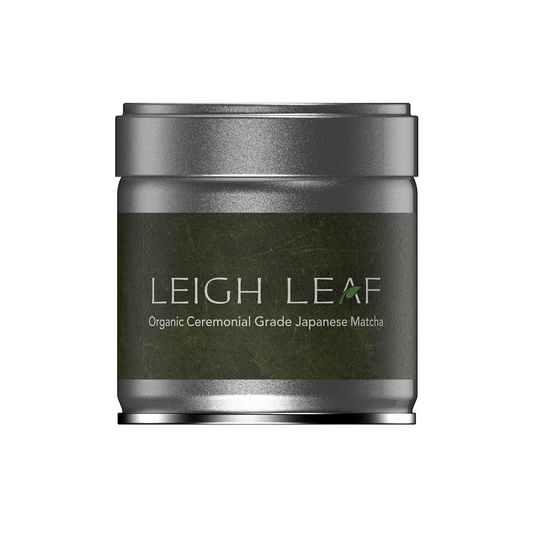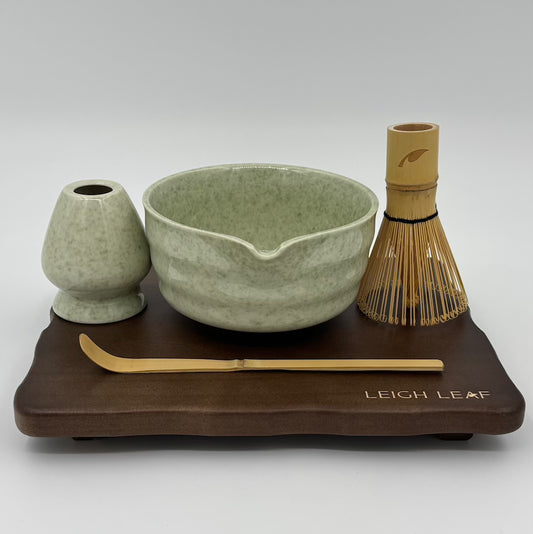
Is Matcha Tea Good for Meditation?
Share
Are you interested in enhancing your meditation practice? Perhaps you've heard whispers about the potential benefits of matcha green tea for calming the mind and fostering a deeper sense of mindfulness. This article explores the intriguing question: Is Matcha Green Tea Good for Meditation? We'll explore how matcha can help you achieve a state of tranquility and focus during your meditation sessions, backed by science, history, and practical tips for incorporating matcha into your daily mindfulness routine.
What Is the Experience of Meditating on Matcha?
Let's start by addressing the question that brought you here. Can matcha green tea truly enhance your meditation experience? The short answer is yes, and we will discuss how and why in this article. Various health benefits have been associated with matcha, a finely ground, powdered green tea.
The Matcha & Mindfulness Connection
Matcha and mindfulness share a deep-rooted connection. Both are ancient practices with origins in East Asia, emphasizing presence, awareness and a sense of calm. Mindfulness encourages being fully present in the moment, while organic green tea matcha ceremonies revolve around the ritualistic preparation and consumption of this vibrant green elixir. Together, they create a harmonious synergy that can elevate your meditation practice.
Matcha's Surprising Benefits for Meditation - According to Science
The link between matcha and meditation isn't just anecdotal; science backs it up. In research, matcha has been shown to enhance cognitive function, improve attention span, and promote relaxation. Matcha's L-theanine increases alpha-wave activity in the brain, indicating relaxed alertness, according to a study in the journal "Psychopharmacology."
Furthermore, matcha is rich in antioxidants, particularly catechins, which provide protection against oxidative stress in brain cells. This neuroprotective effect can support your meditation practice by ensuring your mind is functioning at its best.
History of Matcha and Meditation
To understand the connection between matcha and meditation, it's crucial to delve into their historical roots. Matcha, with its origins in China's Tang dynasty (618–907 CE) before spreading to Japan, has been a part of Zen Buddhist rituals for centuries.
In Japan, matcha became closely associated with meditation and mindfulness through the development of the Japanese tea ceremony, known as "chanoyu" or "sado." This traditional practice emphasizes the preparation and consumption of matcha as a spiritual and aesthetic experience, cultivating a sense of mindfulness and tranquility.
What You See Today in Traditional Tea Ceremonies
Today, traditional tea ceremonies are still practiced in Japan, preserving the connection between matcha and meditation. Usually held in tea houses or private settings, these ceremonies follow specific rituals and etiquette. The process of preparing and savoring matcha offers participants a unique opportunity to practice meditation.
How to Use Matcha at Home for Meditation
Matcha can be incorporated into your meditation practice without a formal tea ceremony.
Here's a simple guide to get you started at home:
- Choose High-Quality Matcha: Start with high-quality ceremonial-grade matcha, known for its vibrant green color and smooth, umami-rich flavor.
- Set the Atmosphere: Find a quiet, comfortable space for your meditation practice. Light some incense or candles if you like to create a serene ambiance.
- Prepare Your Matcha: Whisk the matcha powder with hot water until it forms a frothy, vibrant green tea using a traditional bamboo whisk (chasen).
- Sip Mindfully: Take your time sipping the matcha, paying attention to its flavor, aroma, and the warmth it brings. With every sip, you can ground yourself in the present moment.
- Meditate: After enjoying your matcha, sit in a comfortable meditation posture and begin your practice. It's likely you'll find it easier to focus and stay present with matcha's calming effects.
What Are the Health Benefits of Practicing Mindfulness?
Before delving deeper into the connection between matcha and mindfulness, let's explore the benefits of practicing mindfulness itself. Paying attention to the present moment deliberately and non-judgmentally is the essence of mindfulness. Research has shown that incorporating mindfulness into your daily routine can have several positive effects on your physical and mental well-being.
- Stress Reduction: Meditation promotes relaxation and calms the mind, reducing stress and anxiety.
- Improved Focus: Mindfulness practice can help you stay focused and concentrate on tasks, making it easier for you to enter a state of meditation.
- Emotional Regulation: Being mindful can help you become more aware of your emotions and better control your reactions to them.
- Enhanced Self-Awareness: Through mindfulness, you can gain a deeper understanding of yourself and your thought patterns, allowing you to accept and grow as a person.
- Better Sleep: Mindfulness techniques can improve sleep quality by reducing racing thoughts and promoting relaxation.
Incorporating Matcha and Meditation into Your Daily Routine
Having explored the benefits of both matcha and mindfulness, it's time to discuss how to incorporate them into your daily routine seamlessly.
- Start your day with a mindful matcha ritual. Start the day by preparing and savoring a cup of matcha.
- Midday Pause: Take a break during your busy day to enjoy a moment of mindfulness. Brew a cup of matcha and use it as a reminder to pause, breathe, and refocus.
- Pre-Meditation Routine: If you have a regular meditation practice, consider drinking matcha before your session. It can help calm your mind and create a sense of readiness for meditation.
- Mindful Meals: Extend the principles of mindfulness to your meals. Whether you're eating breakfast or lunch, pair it with a cup of matcha and eat slowly, savoring each bite.
- Preparing a calming cup of matcha at the end of the day will help you wind down. Spend a moment in gratitude and mindfulness, reflecting on your day before bed.
Is Matcha Tea Good for Meditation?
So, to answer the question, "Is Matcha Green Tea Good for Meditation?" Yes, it absolutely is. The combination of L-theanine, caffeine, antioxidants, and the meditative ritual of preparing and sipping matcha can be a powerful tool to enhance your meditation practice. It can help calm your mind, increase your focus, and promote a sense of relaxation, all of which are conducive to a deeper and more meaningful meditation experience. Visit Leigh Leaf to learn more about Matcha.
The Science of Matcha & Meditation
To further understand the science behind matcha's impact on meditation, let's delve into the key components that make matcha such a valuable ally:
L-theanine: This amino acid is abundant in matcha and is known for its relaxation-inducing properties. By stimulating neurotransmitter production, L-theanine induces calm and focus.
Caffeine: Although matcha contains less caffeine than coffee, it still contains caffeine. Matcha is special because L-theanine balances the caffeine content, giving you a steady, steady energy boost without making you feel jittery.
Antioxidants: Matcha contains antioxidants that protect brain cells from oxidative damage, particularly catechins. This protection ensures your mind remains sharp and clear during meditation.
Alpha Brainwaves: Research has shown that L-theanine in matcha increases the production of alpha brainwaves. These brainwaves are associated with a relaxed yet alert mental state, making meditation ideal for them.
The Bottom Line: Matcha and Meditation Go Together
In conclusion, matcha green tea is a valuable companion for your meditation journey. Its unique combination of L-theanine, caffeine, antioxidants, and rich cultural history makes it an ideal choice for those looking to enhance their mindfulness practice. Whether you're a seasoned meditator or just starting out, incorporating matcha into your routine can help you find greater calm, focus, and presence in your daily life. So, why not brew a cup of matcha, sit down, and begin your meditation journey today? It will benefit your mind and body.
By incorporating matcha and meditation into your daily routine, you can improve your mental and emotional well-being. As you sip on this vibrant green elixir and allow its calming effects to wash over you, you'll discover a newfound sense of inner peace and clarity. You can transform your life, one mindful sip at a time, by embarking on this journey.




